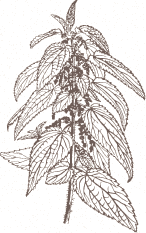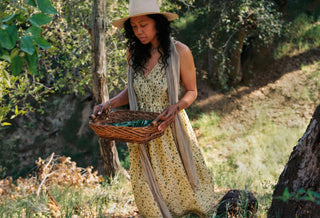Animistic Chef, Creative Consultant, Culinary Artist
Jade Gajumaru’s wisdom is multifaceted and boundless. She listens and learns from the natural world, a student of the teachings of Mother Earth.
 Jade is wearing the The Lincoln Dress In Nettle Ditsy Field
Jade is wearing the The Lincoln Dress In Nettle Ditsy Field
Tell us about yourself
I am Jade Gajumaru, daughter of the Sacred Groves — born from the union of nature and the divine instrument of deep love, nourishment and beauty.
You are from Okinawa, can you share with us why you feel it’s important to stay true to your roots and why you say, “Okinawa is not Japan”?
I am half indigenous Shimanchu or Islander on my matrilineal side. The original inhabitants of Okinawa or Minatogawa people are believed to have lived on the island from over 22,000 to 30,000 years ago as hunters and gatherers. During the Gusuku era between the 12th and 15th centuries, life was said to transition to agrarian society. In 1429 the islands were unified into the Ryukyu Kingdom and enjoyed its own unique culture, philosophy and religion with rites of passage, celebrations and rituals, language, performing arts, crafts, food, and politics until annexed and abolished by Japan in the late 1800s. My family are Gushikuma or of the Gusuku clanspeople. I was brought up farming sugar cane and green beans in the village of Tamagusuku near the Nakagusuku castle ruins. We washed our vegetables at Nakandakarihija, the communal well where my mom showered as a child. My family spoke predominantly Hogen or shimakutuba. We pray in the Sefa Utaki or Sacred Groves. My ancestors drink Awamori, they eat Champuru, they wear Bingata, play Shamisen, we celebrate by dancing Eisa, we have village tug-of-war called Tsunahiki, we have annual dragon boat races called Ugwan Bari or prayers to the water deities for protection of the fisherman and the fertility of the sea. I fall short, but I feel that it is my responsibility to remember, honor and preserve these traditions. Okinawa is not Japan.

“We have the responsibility to support nature through mimicking the natural processes and encouraging healing and regeneration.”
What led you to the world of herbalism? Did your interest in helping those in need, especially elders bring you closer to understanding how to assist in processes of healing?
Yes, in a sense my interest in the healing qualities of plants is informed by my sense of duty to be of service to healing. I believe that the world needs us to thrive in order to support a thriving world. And I have found that for all sentient beings, this is most possible when we are truly seen, truly heard, truly honored and encouraged, supported, and celebrated in bringing our gifts forward.
How have you seen your life change since you’ve acquired this knowledge of the natural world?
I was raised in Ryukyu Shinto Animism. So for me there was never any separation. We are nature. We are born of and into the natural world in order to serve nature, naturally.
What is your relationship with Nettles?
Nettles are a teacher and guide to me. They have taught me many lessons just by being. As with all things they serve as a mirror. In asking the who, what, when, where and why of Nettle I have had many opportunities for introspection.
From interacting with them through the senses- I have learned a lot about boundaries, my own protective mechanisms, our responsibility and relationship to our environment, thriving in community, and I am reminded that again that there is no separation.

Nourishing Nettle Infusion:
makes one quart

Directions:
1. If you’re working with freshly harvested Nettles, use 2-3 oz’s of fresh plant material per quart. To use dried Nettles, use 1 oz (or a handful that fits in your palm) You can buy dried, organic, whole plant material (we recommend them over powders) Mountainroseherbs.com or Pacific Botanicals are good suppliers.
2. Place Nettles into a quart size mason jar.
3. Add hot water from the kettle.
4. Put the lid on right away so the medicine does not evaporate with the steam.
5. Leave your nourishing herbs to infuse on your kitchen counter for 3-4 hours or for more potency, leave overnight. In the morning, strain your infusion and drink as much as your body wants on an empty stomach and throughout the day as needed.
6. This strained infusion can last 2-3 days in the fridge.
7. If you can, take a moment to make this a nourishing practice. Enjoy your herbal infusion in a calm environment, and ask your body to open fully to receive the healing energy of the plants you are drinking.
8. Pour the plant material you had strained into your garden, house plants or compost — it is also very healing and nutritious for the Earth and you will see your plants thriving with you!
There are many ways to prepare nourishing herbs with different quantities, lengths of time, and intentions. For example, steeping your Nettle infusion for 10-20 minutes instead will bring a multitude of benefits and may make the taste and experience more enjoyable. We love learning and sharing the many recipes that have been handed down from different generations and geography — yet another way we become more intimate with each other and more intimate with Mother Earth.
As we foraged, we noticed that due to the lack of rain this past winter, the Nettles are quite small and sparse — we decided not to harvest where we shot. How important is it to steward our plant allies and remain conscious of their needs?
I believe that we have been perfectly constructed. The human form is comprised of all the natural elements. We have been bestowed the gifts of our senses, we are sensual beings, and as such it makes sense that we would use our senses to determine how we interact with our environment. I believe this is called sensory ecology.
When we approach self and other selves with reverence — look, touch, taste, smell, and listen with appreciation, we find that the environment is informed by our well being and that our well being is informed by our environment… and that the beauty of our existence lies in that. Yes, we can trust that when we allow ourselves to just be, to let nature take course without interference, we will flourish naturally, but in the places that have experienced trauma, or where we have caused harm, we have the responsibility to support nature through mimicking the natural processes and encouraging healing and regeneration. I believe that in order to thrive we must co create thriving ecosystems.
“Nettles are often found in disturbed soils and serve to amend the soil in those areas, and should be honored and supported in doing so”
I know you went a bit further north to harvest these, what did you notice about this harvesting location?
Yes. Nettles are often found in disturbed soils and serve to amend the soil in those areas, and should be honored and supported in doing so… but you can find them thriving here in the understory of riparian zones — in damp, nitrogen-rich soil along rivers and streams, and in other full-sun to partially shaded areas that are well fertilized. The other location was a creek bed closer to the coast. Although the creek is mostly dry due to the lack of rain, the soil is still damp in many areas, there is more moisture in the air and the plants seem to be supported by condensation — there are colonies of vibrant green nettles spreading throughout the bed. I offer the plants I work with gratitude and water and harvest the leaves at the bottom of the plant, encouraging photosynthesis in the higher leaves, and as another part of this sacred exchange I will return to help spread the seed.
With honorable harvesting, it’s customary to listen, ask, and offer something before harvesting. Why do you choose to offer water?
I believe that a gift is meant to be an offering that acknowledges a need or desire that has been expressed. It’s not about pomp and circumstance that serve to feed only our egos. The plants need water.

What are some of your favorite nourishing qualities of Nettles?
Nettles are a significant source of protein fiber and vitamin A. But for me on an energetic level, the nutrient dense mineral rich qualities just lend to an overall feeling of immediate replenishment and satiation.
What are some of your favorite things to do with nettles besides making an herbal tea infusion?
Sit with them. Look at them. Listen to them. Water them. Talk to them… but I like to honor their expression culinarily — by infusing them into grains, working with them as a paste / pesto / Chimichurri, adding them to soups… there are honestly innumerable ways for self and other self to be expressed.
How do you honor mother earth?
For me Earth is God. Nature is God. We are nature. We are God. There is no separation. Each day I am filled with gratitude and wonderment as I walk Kami no Michi — the path of the Gods. I honor our mother and our father by serving as their child- integrating their lessons and bringing their gifts forward for posterity through the essence of my being. I pray for my life to be a testament to nurturing, nourishment, and beauty. I strive to create more love than harm and where I cause harm to seek reparation. That is my honor.
With Deep Gratitude,
Jade





